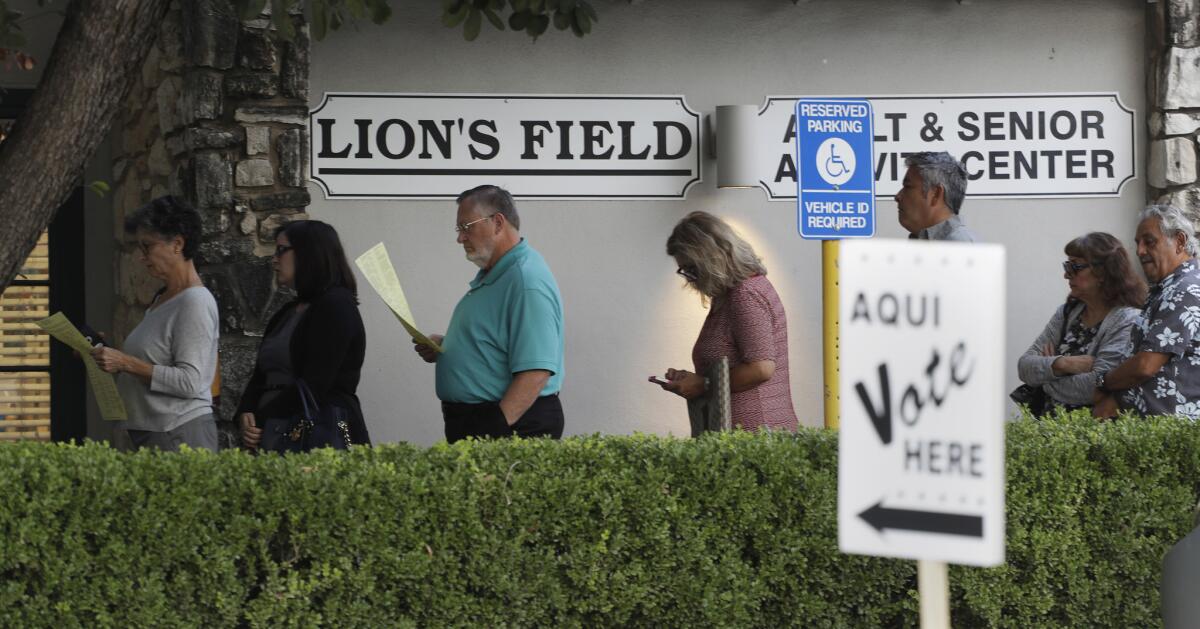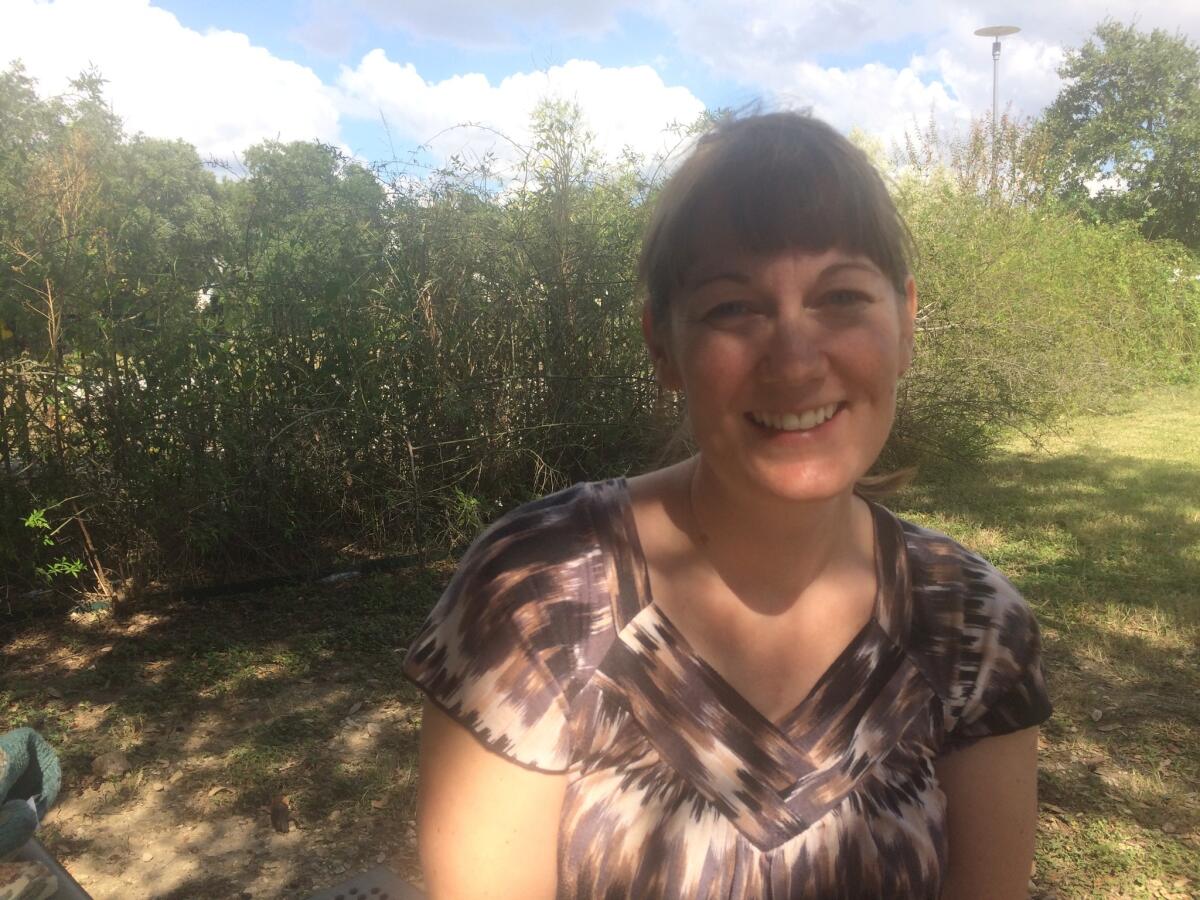Deep in the heart of Texas, Trump has Republicans worried about losing a congressional seat

- Share via
Reporting from sAN anTONIO — Cars were idling bumper-to-bumper in the parking lot, waiting for one of 100 spots to open. A line of more than 90 people snaked through the hallway and out the doors of the branch library, swamped by Texans eager to vote early.
But Heather Neufeld, sitting nearby, was still studying her sample ballot as her two children romped on the play structure beneath a spreading live oak.
She knows who she’s supporting for president — and it isn’t Donald Trump. But San Antonio has one of the most competitive congressional races in the country, and the conservative Republican wanted to know: What does Republican incumbent Will Hurd think of his party’s presidential nominee?
“I wouldn’t want him to say ‘everything Trump stands for, I’m behind,’” said the 41-year-old stay-at-home mom.
Among the late-campaign twists in this odd election year, one of the most implausible is the notion suggested by recent polls that Texas — the GOP’s most reliable big-state bastion — is suddenly in play.
Few who know the state well believe Trump will lose Texas; even before the FBI’s latest exploration of Clinton-related emails roiled the contest, they couldn’t see how the votes for Democrat Hillary Clinton added up.
But many expect the race here will be much tighter than any presidential contest in decades, and that, in turn, could move Democrats a step closer in their uphill fight to gain control of the House.
The party needs to pick up 30 seats to win back the majority, and any plausible scenario includes winning the district here in San Antonio held by Hurd, who, after some equivocation, has strongly denounced his party’s nominee.
“I’ve never endorsed the guy, and I’m not going to,” the freshman lawmaker said in a recent debate, insisting the choice that voters should focus on is the one between himself and Democrat Pete Gallego, who lost the congressional seat two years ago.
Talking about Trump only takes time away from more important issues, Hurd suggested, like terrorism, border security and the needs of the district’s large number of veterans.
“The only reason that Pete keeps talking about Donald Trump is it’s a distraction from the fact that he got absolutely nothing accomplished when he was in Washington, D.C.,” Hurd said.
But, as Neufeld’s concern attests, Trump himself has become a campaign issue — especially among women voters. (She plans to support Darrell Castle, the Constitution Party candidate for president, who qualified for the ballot in about half the states but not California.)

In some of the hardest-fought House races — in California, Nevada, Minnesota, New Jersey and elsewhere — Republican candidates have been distancing themselves from the top of their ticket and working to avoid a backlash over Trump’s many insulting statements.
Party leaders have not discouraged them. House Speaker Paul D. Ryan (R-Wis.) has conspicuously cut himself loose from Trump and urged fellow GOP lawmakers to do the same if needed.
The party’s congressional campaign arm has even put up a TV ad in Illinois, in Rep. Bob Dold’s suburban Chicago district, praising him for being “one of the first Republicans to stand up to Trump.”
Here in San Antonio, Barbara Black was among those who rushed out on the first day of early voting because, she said, there was such a stark difference between the two major-party candidates.
While she doesn’t much care for Clinton, the self-described moderate Republican said “there’s nothing I like about Donald Trump.” She paused and repeated the word like an angry gust. “Nothing.”
So the 63-year-old retired school principal split her ticket, voting to put Clinton in the White House and return Hurd to Congress, reassured by his disavowal of the GOP standard-bearer.
“I certainly don’t want anyone who’s going to stand staunchly behind him,” Black said.
Texas has long been a boneyard for Democratic ambitions.
The party has won just one presidential contest in the past 44 years, in 1976, when Jimmy Carter eked out victory with a scant 51% of the vote. Since then, no Democrat has won even 45% support — and few have bothered trying.
Nor has the party fared much better in state races, winning the governorship just twice since 1978 and losing every statewide contest for nearly two decades.
Two years ago, many Democrats were convinced the political celebrity of state Sen. Wendy Davis would end the party’s drought. But after galvanizing supporters nationwide with a filibuster against anti-abortion legislation, she lost the governor’s race by 20 percentage points.
So, like a bud breaking through layers of cracked and desiccated soil, polls that showed Clinton competitive with Trump have led to extraordinary excitement among Democrats — especially outside Texas — as a harbinger of new life.
Few beyond the most giddy partisans, however, see Clinton’s position as anything more than an oddity, resulting from Trump’s weakness and signaling nothing in the way of long-term realignment.
Her support in the low 40% range is roughly consistent with the strength of past Democratic nominees; Trump, by contrast, is running 10 percentage points or more below what a Republican nominee would normally expect, which is making the presidential contest closer than usual.
“It’s a one-off thing,” said Cal Jillson, a professor and political analyst at Southern Methodist University in Dallas, stating the consensus view shared by strategists in both parties. “Texas is still a very red state.”
The 23rd Congressional District, however, stands as an exception.
Ranging across 58,000 square miles, from El Paso to San Antonio, the district takes in almost a quarter of the state, swooping down to include 800 miles of the U.S.-Mexico border.
Overwhelmingly Latino and home to a number of military installations, it is one of few toss-up congressional districts in the country, swinging back-and-forth between parties in every election since 2010
Two years ago, in a strong Republican year, Hurd unseated Gallego by fewer than 2,500 votes. A much higher Democratic turnout, typical of a presidential year, was expected to boost Gallego in their rematch — and that was before Trump won the GOP nomination.
When the “Access Hollywood” videotape surfaced, and Trump was heard crudely boasting of how he could get away with forcing himself on women, Hurd was quick to denounce him.
He called Trump’s remarks “utterly sickening and repulsive” and urged him to “step aside for a true conservative.”
Gallego immediately hit back with a TV ad saying Hurd waited too long to repudiate Trump, an assertion he reiterated in last week’s debate.
“Mr. Hurd finally says, after that tape comes out, where he’s talking so horribly, so horribly about women, that he’s opposed to Mr. Trump,” Gallego said. “Frankly, that is 15 months too late.”
For some, bombarded by a ceaseless barrage of negative ads, the back-and-forth has gone on entirely too long, becoming unhappily like the pungent presidential race.
“I expected a bit more class in the way they promoted themselves, not just denigrating their opponent,” said Republican Gabrielle Radley, 54, pausing outside a grocery store on the affluent north side of San Antonio.
Asked her pick in the congressional race, she said neither: “I’m tired of both of them.”
On Twitter: @markzbarabak
ALSO
The FBI director had a choice in the new Clinton email probe: Follow custom, or go public
Hillary Clinton is helping Senate candidates now so they can help her if she wins the White House
More to Read
Get the L.A. Times Politics newsletter
Deeply reported insights into legislation, politics and policy from Sacramento, Washington and beyond. In your inbox twice per week.
You may occasionally receive promotional content from the Los Angeles Times.








